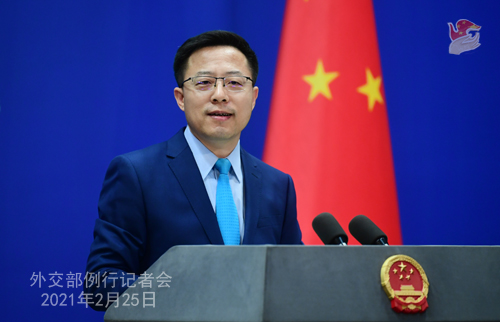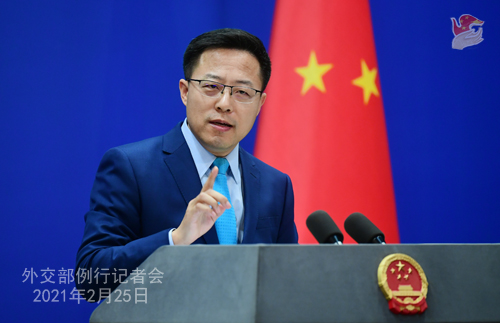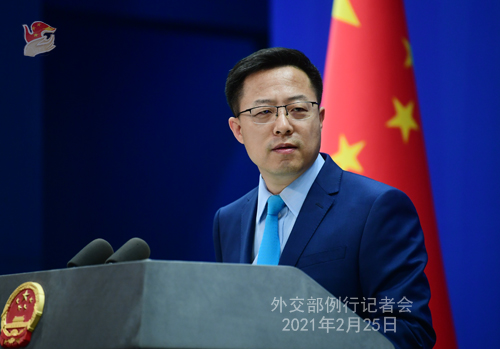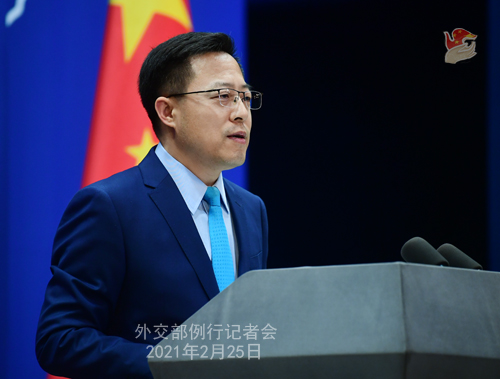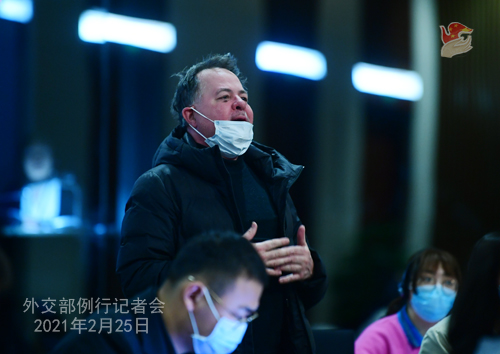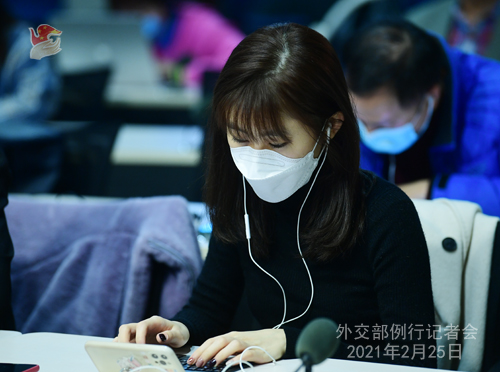| Foreign Ministry Spokesperson Zhao Lijian's Regular Press Conference on February 25, 2021 |
| 2021-02-25 20:44 |
|
CCTV: We noted that Chinese-aided and -exported vaccines have arrived in Mongolia, Egypt, Thailand, Singapore, the Dominican Republic and Bolivia, etc. Also, health authorities in countries in vaccine cooperation with China have affirmed Chinese vaccines are safe and effective. Do you have any comment? Zhao Lijian: China has provided and is providing vaccine aid to 53 countries, and has exported and is exporting vaccines to 27 countries, as part of our effort to follow through on President Xi's pledge to make vaccines a global public good. The Chinese government has always taken a responsible attitude towards life, given top priority to vaccine safety and effectiveness, and guided Chinese enterprises to conduct vaccine research and development in strict accordance with scientific laws and regulatory requirements. You mentioned the recognition of the safety and effectiveness of Chinese vaccines by relevant countries' health authorities. Besides, dozens of countries have approved the use of Chinese vaccines, which affirms the quality of China's vaccines. We will continue to work with other parties to promote equitable distribution of vaccines worldwide to jointly fight the virus. Phoenix TV: U.S. President Biden signed an executive order on February 24 to review global industrial chains of four key products including semiconductors to reduce the reliance on foreign suppliers especially Chinese ones. If "major risks" are found in key industries, the United States will promptly advance the transfer of supply chains. Do you have any comment on this? Is there a greater risk for China and the United States to decouple in the area of science and technology? Zhao Lijian: In an era of globalization, the interests of all countries are highly intertwined. The formation and development of global industrial and value chains is the result of both the market rules and the choice of the business communities. China believes that artificial industrial "transfer", "decoupling" and altering economic laws with political forces is an unrealistic approach that can neither solve domestic problems nor do anything good to global industrial and supply chains. We hope the United States will earnestly respect the laws of market economy and the rules of free trade, and safeguard the security, reliability and stability of global industrial and supply chains. Global Times: Several western countries have used Xinjiang-related issues to accuse China of human rights violations at the 46th session of the UN Human Rights Council. China's representative refuted their accusations there and then. Do you have anything more to add? Zhao Lijian: Rumors fly easily from these people's lips, but dissolving them takes such arduous efforts. The allegations of "genocide" and "forced labor" can never stand the test of facts. Here are some numbers and examples. Over the past 60 years and more, the average life expectancy of people in Xinjiang has more than doubled, growing from 30 to 72 years. The Uyghur population in Xinjiang has also doubled over the past four decades, registering an increase rate of 25% from 2010 to 2018 alone, which was 12 times higher than that of the Han population. My friends from the press, do you honestly think this is "genocide"? As for lies that the anti-China scholar Adrian Zenz and ASPI have cooked up to smear Xinjiang, we have sought to clarify the situation multiple times. One of Adrian Zenz's "reports" contains a picture dated May, 2017 showing two Xinjiang seniors accepting medical examinations. The annotation to that picture alleges "these health checks have become ubiquitous as a means to control population growth." But through verification, one will find it's just a picture of rural residents taking physical examinations and medical treatment free of charge. The so-called "380 detention centers" in the ASPI reports are facilities like schools and government buildings. They are not at all "detention centers." Excuses are everywhere if one is bent on hurling accusations at someone. I have to say that the last thing on the mind of certain Western countries is the well-being of people in Xinjiang. They simply want to interfere in China's internal affairs and disrupt the development of Xinjiang and the whole China under the pretext of human rights. But they should know that their plans will never work out. They should be mindful of their own shameful past of slaughtering indigenous people, as well as their domestic problems of severe racial discrimination and rights abuses against the indigenous people. They don't need to look any further for a place to pin their "genocide" label. Just take a mirror.
AFP: The French foreign minister denounced what he called "institutionalized repression" of the Uyghur minority when speaking at the UNHRC. The minister said witness accounts and documents from Xinjiang pointed to unjustifiable practices towards Uyghurs and a system of large-scale surveillance and institutionalized repression. We wonder if the foreign ministry has any response to these comments? Zhao Lijian: China has stated our position on Xinjiang-related issues on multiple occasions. In essence, these issues are about countering violence, terrorism and separatism. The Xinjiang region's de-radicalization efforts have no fundamental differences from the practices by many other countries. They are consistent with the UN Global Counter-terrorism Strategy and the Plan of Action to Prevent Violent Extremism. There's no repression or suppression in Xinjiang. The region today is in its best times of prosperity, where all residents enjoy a happy, stable and harmonious life with no restraints on personal liberty. Xinjiang's door to the world is open as always. All people who have visited Xinjiang can see the truth themselves. Reuters: U.S. President Joe Biden's nominee to be director of the CIA said the key to U.S. national security was countering "the authoritarian adversary of China". Do you have any comment? Zhao Lijian: Over the past few years, out of political purposes, the former U.S. administration made severe miscalculations and misinterpretations on China's goals and policies, and took many containment and oppressive measures that caused immeasurable damage to China-U.S. relations, which went against the fundamental interests of the two peoples. We always believe that the China-U.S. relationship is not a zero-sum game. Both countries share broad common interests. It's natural that we have differences, but the relationship cannot be solely defined by the differences. We hope the United States can abandon the zero-sum game mindset, view China and China-U.S. relations in an objective and rational manner, adopt positive, constructive China policies, and work with China in the same direction to focus on cooperation, manage differences, and bring the China-U.S. relations back to the track of sound and stable development. Prasar Bharati: India and South Africa put forward a proposal in October last year, in which they demanded at World Trade Organization that intellectual property regime should be waived for COVID vaccines, medicines and other logistics. Will China join this initiative? Zhao Lijian: You are asking about a matter in another professional field. I'd refer you to the competent authorities.
UPI: China is one of the biggest importers of corn to the United States, especially last year. I'm wondering if the corn imports will remain the same or what's your projection on US-China corn trade? Zhao Lijian: Yesterday the Ministry of Commerce stated China's position on China-US trade ties going forward. You may read the transcript. I'll leave your specific question on trade to the competent authorities. AFP: Some US officials have said that they have been subject to anal swab tests for the coronavirus in China. The US State Department spokesman told the Washington Post it was evaluating all reasonable options to address this issue. The aim was to preserve the dignity of US officials consistent with the Vienna Convention. There was a report that said the tests were given in error. Can the foreign ministry confirm whether anal swab tests are conducted for incoming foreign diplomats including those from the USA? Zhao Lijian: I checked this with my colleagues. As far as I know, China has never asked U.S. diplomats stationed in China to do anal swab tests. Associated Press: You said earlier that between US and China we should try to manage our differences. We should try to seek areas of cooperation. I'm wondering based on the statements by members of the Biden administration so far, do you feel that the US is doing this positively or do you think it's maybe too early to say? Zhao Lijian: President Xi's phone call with President Biden on February 11 was guidance for China-U.S. relations going forward. Following the spirit of the presidents' talks, the Chinese and U.S. authorities should earnestly implement their consensus. Prasar Bharati: Regarding my previous question on the WTO, I have already asked the commerce ministry and I did not get any response from them. And also this question is not purely related to commerce. It has a diplomatic angle as well. That's why I asked the foreign ministry, whether you had considered this proposal. Do you have any comment on it? Zhao Lijian: Earlier I stated China's position. I can help to convey your questions to the competent authorities.
Prasar Bharati: As per reports, Pakistan has requested China to reschedule their debts to the scale of 22 billion US dollars in power projects that China has funded. Can you please confirm this? Zhao Lijian: We have made clear responses to similar questions on multiple occasions. I don't know how you came up with this number, but I guess you are asking about the loans of power and energy projects under the framework of China-Pakistan Economic Corridor (CPEC), right? I know the energy projects very well from years of experience working in Pakistan. I can assure you that these projects are supported by commercial investment or foreign direct investment. They are invested by Chinese companies and the Pakistani government does not need to repay any of the loans. Therefore, the projects won't bring debt burden to Pakistan. The construction and operation of the projects are well underway. They provided a large amount of stable and affordable power supply to Pakistan and increased the Pakistani government's tax revenue, delivering tangible economic and social benefits. We are confident that China-Pakistan energy cooperation will continue to make greater contribution to Pakistan's national development and people's well-being. Bloomberg: Katherine Tai, President Biden's nominee for the US Trade Representative, said that China is both a rival and a partner, according to the text of remarks seen by Bloomberg ahead of her confirmation hearing Thursday. Tai also said China needed to be held accountable for unfair trade practices. Does the foreign ministry have any comment? Zhao Lijian: China-US economic and trade relationship is mutually beneficial in nature. Issues in trade should be properly resolved on the basis of mutual respect and equal-footed consultation. We firmly oppose groundless accusations against and even stigmatization of China's normal economic and trade activities.
****************** Before we conclude today's press briefing, I'd like to share with you some good news. The Bilibili account of the MFA Spokesperson's Office got over one million followers just 24 hours after its launch on February 22. I am also glad to see that the MFA Spokesperson's Office now has nearly two million followers on Weibo, about five million on Kuaishou, and nearly 15 million on Douyin. Taking this occasion, I want to thank you for supporting the social media accounts of the MFA Spokesperson's Office, and hope you will continue following our latest updates on the spokespersons' remarks in Lanting.
|
| |||||||||||||||
|
|||||||||||||||


